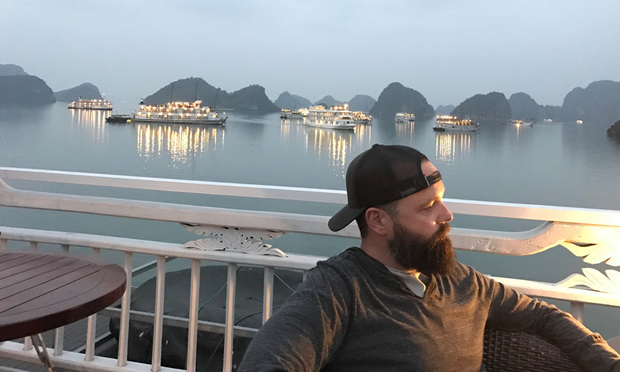Why the Sidley suicide story resonates with anyone who knows Big Law firm life
What killed Gabriel MacConaill was the type of work most lawyers do: helping a company make or save money
November 19, 2018 at 12:00 AM
4 minute read
The original version of this story was published on The American Lawyer
 Gabriel MacConaill in Halong Bay
Gabriel MacConaill in Halong Bay
Above all else, it was painful to read Joanna Litt's essay about the suicide of her husband, Gabe MacConaill, a 42-year-old partner at Sidley Austin in Los Angeles. Whether you agree or not with Litt that 'Big Law killed her husband', elements of that story will certainly hit home with just about everyone who has spent more than an hour in a Big Law firm.
For me, it brought me back to my days as a young associate decades ago – and the memories it unveiled were not pleasant. It took me back to a time when I felt constantly unsure, nervous and unmoored.
Among Litt's descriptions of her husband's anxieties, this one struck a particular chord: "He said he felt like a phoney who had everyone fooled about his abilities as a lawyer, and thought after this case was over, he was going to be fired."
For the five years or so I spent as a corporate associate, that feeling that I was merely posing as a lawyer rang true. Did I really know what I was doing? Did I grasp all the tax, securities and other complicated legal issues underlying the deal? Surely not. And even if I did something well – wrote a good research memo, drafted a decent contract or kept a client happy for another day – wasn't it just a lark?
Of course, I never rose to the career heights that MacConaill did. Never tried. Never even thought of trying.
Which is what makes MacConaill's story even more jarring: he already had passed the big test and won the grand prize of partnership. He was an experienced, well-regarded bankruptcy lawyer at a top firm. Yet, he basically felt as insecure and vulnerable as some random junior associate on rotation.
I find that remarkable, yet I'm not entirely surprised. The Big Law profession doesn't give you much sense of security – much less validation or warmth. It's such a cliché, but it's true: you're only as good as your last deal or case, and you live in constant fear that the client or rainmaking partner who's giving you work might cut you off any moment.
In trying to understand her husband's suicide, Litt writes that she read about the concept of "maladaptive perfectionism, that combines unrealistic standards of achievement with hypercriticism of failing to meet them". She adds: "Gabe displayed most if not all of the characteristics. Simply put, he would rather die than live with the consequences of people thinking he was a failure."
The cult of perfectionism is indeed pervasive in law firms – the notion that you should feel deep shame about an inconsequential typo or experience terror for not properly reading the unstated wishes of some client or senior partner. Even as an associate, I always found all of this ridiculous, but it's hard not be caught in that culture when you're in it.
MacConaill seemed to have been totally steeped in that culture. His wife had suggested to him that he quit, and "he said he couldn't quit in the middle of a case", adding: "The irony is not lost on me that he found it easier to kill himself." She also writes: "We spoke a handful of times about how he should just try to care less about the work, but knowing the kind of person my husband was, that was never going to happen."
As I said at the beginning of this post, it's ultimately just sad. What makes it profoundly even sadder is that he seemed to have killed himself over the pressures of being a lawyer. And what prompted all of this – at least in the immediate picture – is a bankruptcy for a mattress company. He wasn't working on curing a horrible disease, solving world hunger or stopping terrorism.
What killed MacConaill was the type of work most lawyers do: helping a company make or save money. Nothing flashy. Nothing life-altering. Which is what makes it all so prosaic, poignant and simply sad.
This content has been archived. It is available through our partners, LexisNexis® and Bloomberg Law.
To view this content, please continue to their sites.
Not a Lexis Subscriber?
Subscribe Now
Not a Bloomberg Law Subscriber?
Subscribe Now
NOT FOR REPRINT
© 2025 ALM Global, LLC, All Rights Reserved. Request academic re-use from www.copyright.com. All other uses, submit a request to [email protected]. For more information visit Asset & Logo Licensing.
You Might Like
View All
The Quiet Revolution: Private Equity’s Calculated Push Into Law Firms
5 minute read

Trending Stories
Who Got The Work
J. Brugh Lower of Gibbons has entered an appearance for industrial equipment supplier Devco Corporation in a pending trademark infringement lawsuit. The suit, accusing the defendant of selling knock-off Graco products, was filed Dec. 18 in New Jersey District Court by Rivkin Radler on behalf of Graco Inc. and Graco Minnesota. The case, assigned to U.S. District Judge Zahid N. Quraishi, is 3:24-cv-11294, Graco Inc. et al v. Devco Corporation.
Who Got The Work
Rebecca Maller-Stein and Kent A. Yalowitz of Arnold & Porter Kaye Scholer have entered their appearances for Hanaco Venture Capital and its executives, Lior Prosor and David Frankel, in a pending securities lawsuit. The action, filed on Dec. 24 in New York Southern District Court by Zell, Aron & Co. on behalf of Goldeneye Advisors, accuses the defendants of negligently and fraudulently managing the plaintiff's $1 million investment. The case, assigned to U.S. District Judge Vernon S. Broderick, is 1:24-cv-09918, Goldeneye Advisors, LLC v. Hanaco Venture Capital, Ltd. et al.
Who Got The Work
Attorneys from A&O Shearman has stepped in as defense counsel for Toronto-Dominion Bank and other defendants in a pending securities class action. The suit, filed Dec. 11 in New York Southern District Court by Bleichmar Fonti & Auld, accuses the defendants of concealing the bank's 'pervasive' deficiencies in regards to its compliance with the Bank Secrecy Act and the quality of its anti-money laundering controls. The case, assigned to U.S. District Judge Arun Subramanian, is 1:24-cv-09445, Gonzalez v. The Toronto-Dominion Bank et al.
Who Got The Work
Crown Castle International, a Pennsylvania company providing shared communications infrastructure, has turned to Luke D. Wolf of Gordon Rees Scully Mansukhani to fend off a pending breach-of-contract lawsuit. The court action, filed Nov. 25 in Michigan Eastern District Court by Hooper Hathaway PC on behalf of The Town Residences LLC, accuses Crown Castle of failing to transfer approximately $30,000 in utility payments from T-Mobile in breach of a roof-top lease and assignment agreement. The case, assigned to U.S. District Judge Susan K. Declercq, is 2:24-cv-13131, The Town Residences LLC v. T-Mobile US, Inc. et al.
Who Got The Work
Wilfred P. Coronato and Daniel M. Schwartz of McCarter & English have stepped in as defense counsel to Electrolux Home Products Inc. in a pending product liability lawsuit. The court action, filed Nov. 26 in New York Eastern District Court by Poulos Lopiccolo PC and Nagel Rice LLP on behalf of David Stern, alleges that the defendant's refrigerators’ drawers and shelving repeatedly break and fall apart within months after purchase. The case, assigned to U.S. District Judge Joan M. Azrack, is 2:24-cv-08204, Stern v. Electrolux Home Products, Inc.
Featured Firms
Law Offices of Gary Martin Hays & Associates, P.C.
(470) 294-1674
Law Offices of Mark E. Salomone
(857) 444-6468
Smith & Hassler
(713) 739-1250









